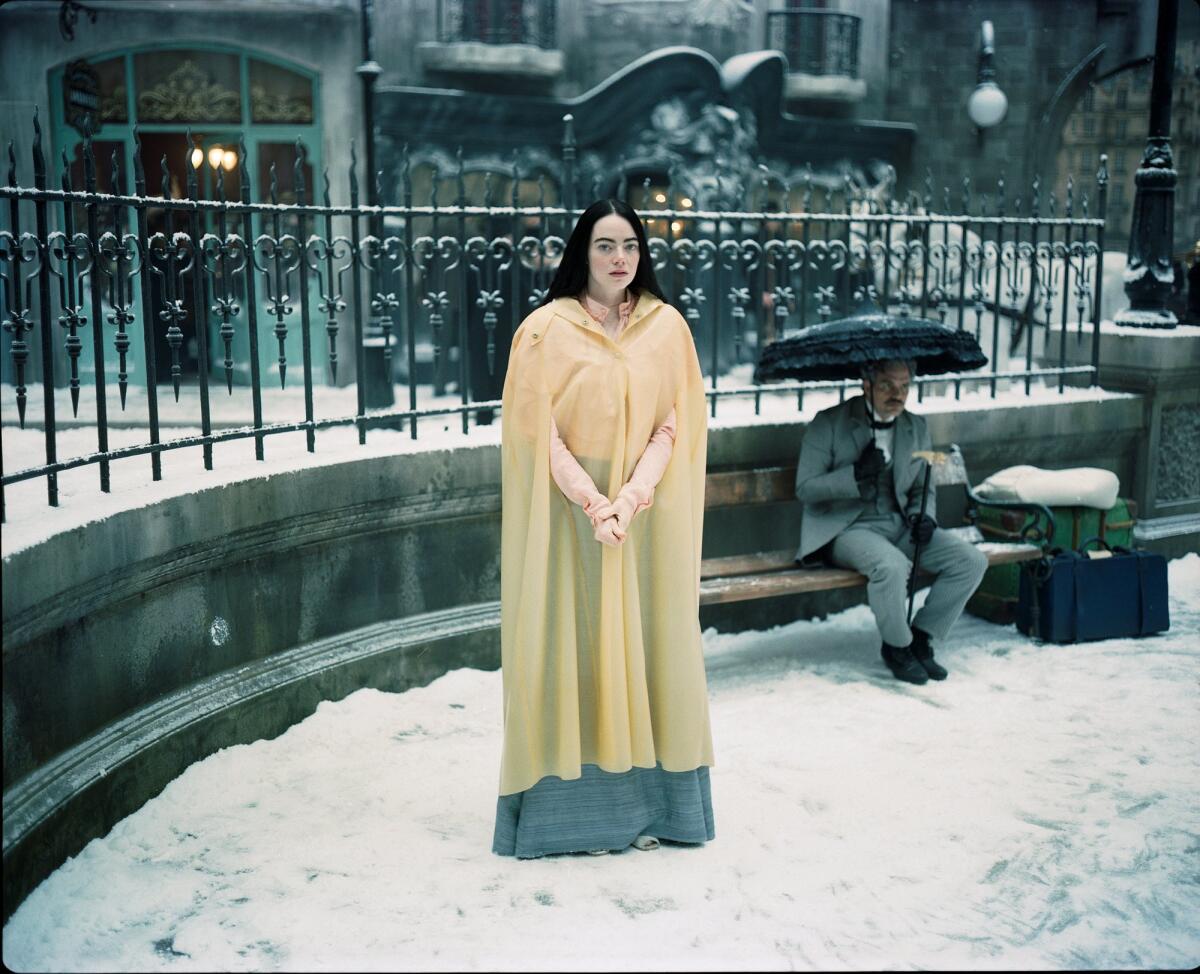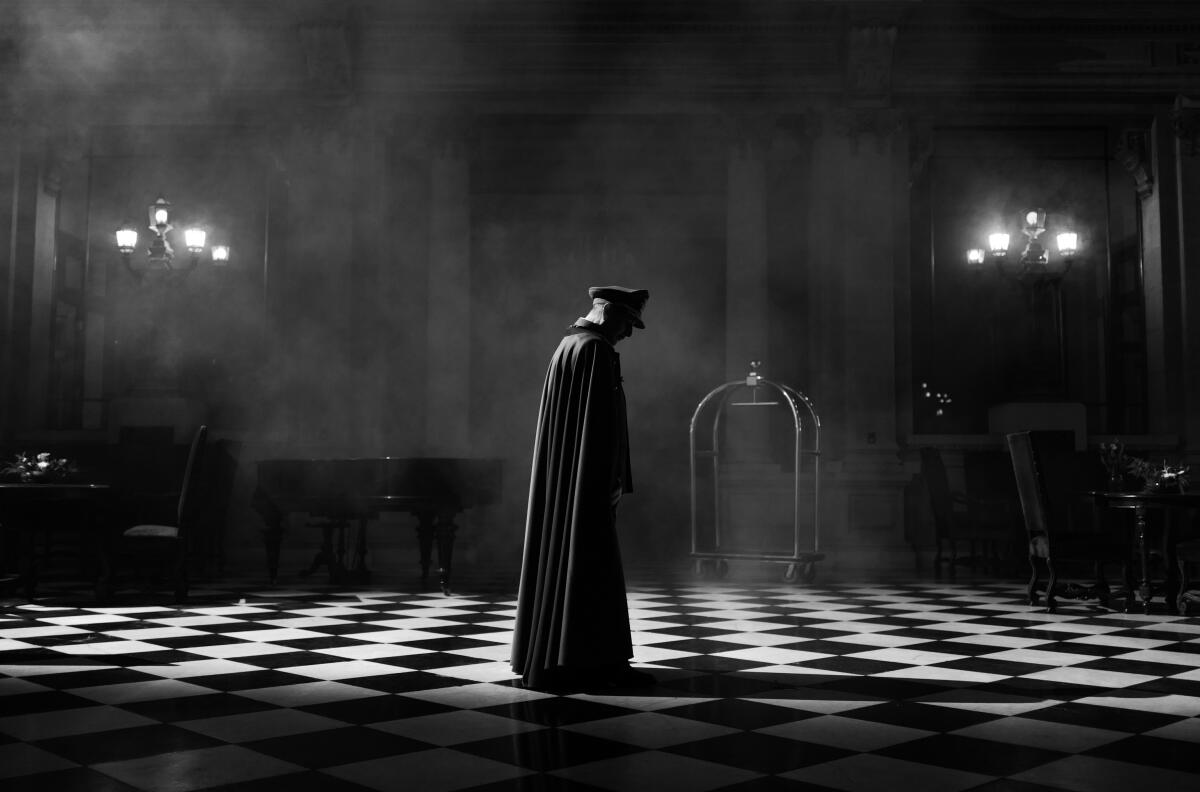‘Poor Things’ brings hot sex and Stone-cold brilliance to the film festival season

- Share via
TELLURIDE, Colo. — “We are all cruel beasts — born that way, die that way.”
This Hobbesian pronouncement arrives deep into Yorgos Lanthimos’ “Poor Things,” the latest work from a filmmaker with a career-long interest in cruelty and beasts. Human and animal fates tend to be disturbingly bound together in Lanthimos’ movies, the titles of which could populate an absurdist art-house menagerie. “Dogtooth” and “The Killing of a Sacred Deer” both feature doomed pets. So does “The Lobster,” in which lonely singles are destined to be transformed into animals. “The Favourite” has racing ducks, slaughtered pigeons and 17 royal rabbits, one of which Emma Stone nearly crushes underfoot.
Stone mercifully doesn’t abuse any bunnies in “Poor Things.” But her character, a dark-haired, gimlet-eyed oddity named Bella Baxter, does grow up in the care of a scientist-surgeon, Godwin (Willem Dafoe), who specializes in bizarre forms of animal experimentation. Bella herself is a kind of experiment, as you soon gather from her unsteady gait, childlike speech patterns and gleefully anarchic spirit. Raised in a temporally dissonant, technologically fanciful Victorian-steampunk vision of London, she is the unsubtly named Godwin’s most sublime creation. Bella is also an entrancing addition to Stone and Lanthimos’ expanding gallery of antiheroines; the two recently made a short film, “Bleat” (expect goats), that’s making the festival rounds, and they have another feature collaboration, titled “And,” in the works.
For now, moviegoers with an appetite for Lanthimos’ brand of cinematic mischief can look forward to “Poor Things,” a splendidly deranged science-fiction-horror-comedy-fantasia that just premiered at the Venice International Film Festival. Because of the ongoing SAG-AFTRA strike, the actors opted to skip Venice and aren’t promoting the film, although Stone is reportedly in attendance at the Telluride Film Festival, where the movie will make its North American bow Saturday night. The strike also accounts for why “Poor Things,” originally scheduled for a Sept. 8 theatrical release by Searchlight Pictures, has now been postponed until Dec. 8. The hope is that by then the strike will be over, freeing Stone to publicize one of the more extraordinary performances of her career and certainly the most audacious.
I hope she’ll get the chance. For now, though, there is something to be said for letting Bella’s weird and wondrous story seep into the public imagination unilluminated — and also perhaps undiluted — by an actor’s commentary. For those who wish to preserve the purity of the “Poor Things” experience (and who haven’t read Alasdair Gray’s 1992 source novel of the same title), I’ll write as vaguely around the premise as possible, especially the bizarre specifics of Bella’s origins. Suffice to say that Lanthimos and his screenwriter, Tony McNamara (“The Favourite”), draw deftly and knowingly on the canon of reanimator science fiction. You might flash back on James Whale’s classic “Frankenstein” movies during the early black-and-white scenes of Bella stumbling around Godwin’s laboratory, at least until the scene where she pauses, with palpable delight, to flick at a cadaver’s penis.

The mysteries of the flesh are of immediate and obsessive fascination to Bella (“Let us touch each other’s genital pieces,” she declares to the flustered young surgeon, played by Ramy Youssef, whom Godwin has enlisted to study her). Like the physically and psychologically imprisoned teenagers in “Dogtooth,” Bella is in desperate need of physical liberation and carnal release, though she is markedly more successful at engineering both. Cinematographer Robbie Ryan’s monochrome images explode into full, orgasmic color at precisely the moment Bella launches into a frenzy of fornication with a mustachioed sleaze named Duncan Wedderbern (a supremely hammy Mark Ruffalo), her first but hardly her last bedfellow in what will surely go down as one of the most sexually forthright movies ever released under the Disney banner.
And so “Poor Things” becomes not just an account of Bella’s sentimental education but also a record of her astonishingly rapid-fire sexual evolution; it’s “Candide” with cunnilingus. Like “Passages,” Ira Sachs’ recent, ratings-board-embattled erotic drama, Lanthimos’ movie offers bracing assurance that grown-up sexuality — though whether the wide-eyed woman-child Bella can be regarded as a consenting adult is one of the story’s thornier mysteries — has not yet been banished from the cinema screen. But there is more than prurience or even provocation at work here. For all its wicked playfulness, its matter-of-fact nudity, its lewdly inventive sexual euphemisms (from “sugar tart lick me all day” to “furious jumping”) and a third-act plunge into the lower depths of the world’s oldest profession, “Poor Things” turns out to have something entirely serious on its very dirty mind.
Bella’s early dalliances with Duncan are pure hedonistic bliss, but they also provide an entrée into tougher, more troubling realms. Duncan whisks her off to Portugal, Egypt and France, marked by macaron-hued skies and populated by all manner of fascinating strangers. (The delightfully oddball ensemble includes Jerrod Carmichael, Kathryn Hunter, Margaret Qualley, Suzy Bemba, Christopher Abbott and the great German veteran Hanna Schygulla.) Through these encounters, Bella comes to grasp the existence of suffering, the reality of poverty as well as luxury, and the tendency of men — whether they are kindly, misguided science enthusiasts like Godwin or brutish ne’er-do-wells like Duncan — to subjugate women to their own heedless fancies.
Bella’s sexual liberation becomes a moral awakening of sorts, and Stone, having committed fully to the character’s often-maniacal sense of mischief, brings equal conviction to her sudden wellsprings of compassion. Unlike the conniving courtier Stone played in “The Favourite,” Bella doesn’t have a calculating bone in her body; she’s all reckless id, a purely instinctual creature. But that’s why it’s so weirdly moving to watch the stirrings of a deeper consciousness, her gradual recognition of her place in a world that’s far more brutally misshapen than she is. We may indeed be cruel beasts, Bella learns, but that doesn’t mean that she herself must embrace cruelty in turn.
I’m only half-joking when I suggest that “Poor Things” would make an intriguing double bill with Greta Gerwig’s “Barbie,” another movie about a woman — a construct — who travels to distant realms, unravels the lie of her own existence and returns home to handily dismantle the patriarchy. You can imagine the Pygmalion myth resonating with Lanthimos, and not just because he’s Greek. From “Dogtooth” on, his movies have often played like elaborate behavioral experiments, overseen by a mad scientist or perhaps a mischievous god.
His manipulations are divisive by design, and “Poor Things,” with its scarred flesh and bared genitals, its anatomy-textbook dissections and vivisectional set pieces, may be the definition of A Movie Not for Everyone. But from its lyrically stylized imagery to its unaccountably happy ending, it is also for many more people than its extreme-sounding logline and arresting, outlandish imagery might suggest. A drama of female empowerment and prosthetic dismemberment rolled into one, it may be the first Lanthimos movie in which this unsparing filmmaker doesn’t just slice his characters open but actually likes what he sees.

Reanimated bodies, harvested organs and other sanguinary delights also turn up in “El Conde” (“The Count”), a clever if overextended amalgam of history and horror from the protean Chilean director Pablo Larraín. Shot in beautiful black-and-white by the great cinematographer Ed Lachman, the movie asks the question: What if the brutal dictator Augusto Pinochet (played by Jaime Vadell) was in fact a 250-year-old vampire, a demon who lived many lives and chewed many necks before seizing power in a 1973 military coup that plunged Chile into years of horrific oppression and violence? And what if, instead of succumbing to heart failure in 2006 at the age of 91, Pinochet had instead faked his death and is even now quietly waiting for the next chapter of immortality?
The initial answers provide no shortage of grim amusement, especially when a young Pinochet witnesses the French Revolution and proceeds to learn all the wrong lessons from it (though not before licking the blade of Marie Antoinette’s guillotine). For a while the story’s ambitious mix of comedy and horror is held together by an elegant, unctuous narrator whose identity I won’t spoil here; suffice to say that it gives this playfully ludicrous story its political bite. It could use more of that bite, especially during a protracted midsection that finds Pinochet lying low with his miserable, money-grubbing descendants. Their attempts to recover what they can of Daddy Dracula’s ill-gotten fortune are facilitated by an accountant (a striking Paula Luchsinger) with her own angelic and devilish designs.
The casting of one of history’s greatest monsters as a literal blood-sucking monster is such an ingenious premise, you almost can’t blame Larraín for leaning on it so heavily. To some extent, he has made a throwback to his supremely bleak dramas about the Pinochet era, “Tony Manero” and “Post Mortem,” which made his reputation before his swerve into starry English-language biopics like “Jackie” and “Spencer.” “El Conde,” which Netflix will release theatrically Sept. 8 and on its platform Sept. 15, doesn’t match those earlier Pinochet films for sheer bone-chilling impact. Still, there’s something fitting about Larraín’s decision to return to his roots; it’s a chance to flex new genre muscles, but it also bears out his point that fascism never truly dies.
More to Read
Only good movies
Get the Indie Focus newsletter, Mark Olsen's weekly guide to the world of cinema.
You may occasionally receive promotional content from the Los Angeles Times.











